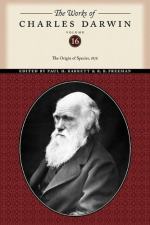The following case is far more remarkable, and seems at first quite incredible; but it is the result of an astonishing number of experiments made during many years on nine species of Verbascum, by so good an observer and so hostile a witness, as Gartner: namely, that yellow and white varieties of the same species of Verbascum when intercrossed produce less seed, than do either coloured varieties when fertilised with pollen from their own coloured flowers. Moreover, he asserts that when yellow and white varieties of one species are crossed with yellow and white varieties of a distinct species, more seed is produced by the crosses between the same coloured flowers, than between those which are differently coloured. Yet these varieties of Verbascum present no other difference besides the mere colour of the flower; and one variety can sometimes be raised from the seed of the other.
From observations which I have made on certain varieties of hollyhock, I am inclined to suspect that they present analogous facts.
Kolreuter, whose accuracy has been confirmed by every subsequent observer, has proved the remarkable fact, that one variety of the common tobacco is more fertile, when crossed with a widely distinct species, than are the other varieties. He experimentised on five forms, which are commonly reputed to be varieties, and which he tested by the severest trial, namely, by reciprocal crosses, and he found their mongrel offspring perfectly fertile. But one of these five varieties, when used either as father or mother, and crossed with the Nicotiana glutinosa, always yielded hybrids not so sterile as those which were produced from the four other varieties when crossed with N. glutinosa. Hence the reproductive system of this one variety must have been in some manner and in some degree modified.
From these facts; from the great difficulty of ascertaining the infertility of varieties in a state of nature, for a supposed variety if infertile in any degree would generally be ranked as species; from man selecting only external characters in the production of the most distinct domestic varieties, and from not wishing or being able to produce recondite and functional differences in the reproductive system; from these several considerations and facts, I do not think that the very general fertility of varieties can be proved to be of universal occurrence, or to form a fundamental distinction between varieties and species. The general fertility of varieties does not seem to me sufficient to overthrow the view which I have taken with respect to the very general, but not invariable, sterility of first crosses and of hybrids, namely, that it is not a special endowment, but is incidental on slowly acquired modifications, more especially in the reproductive systems of the forms which are crossed.
Hybrids and mongrels compared, independently of their fertility.




